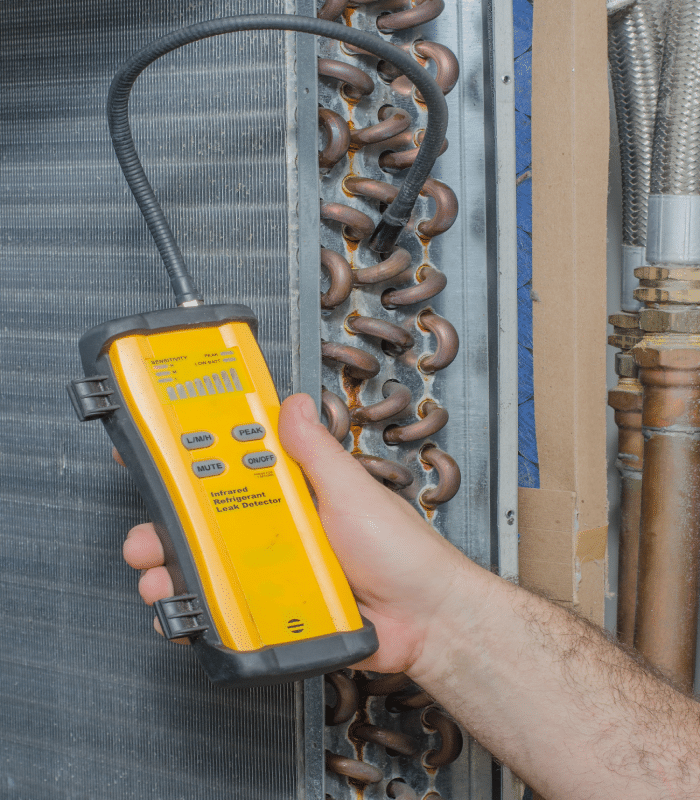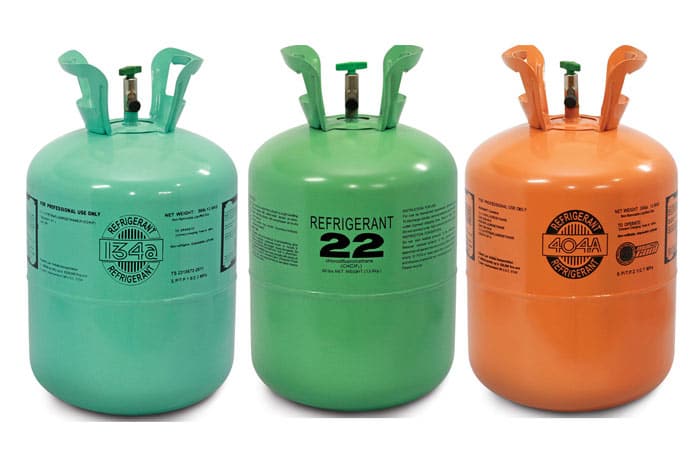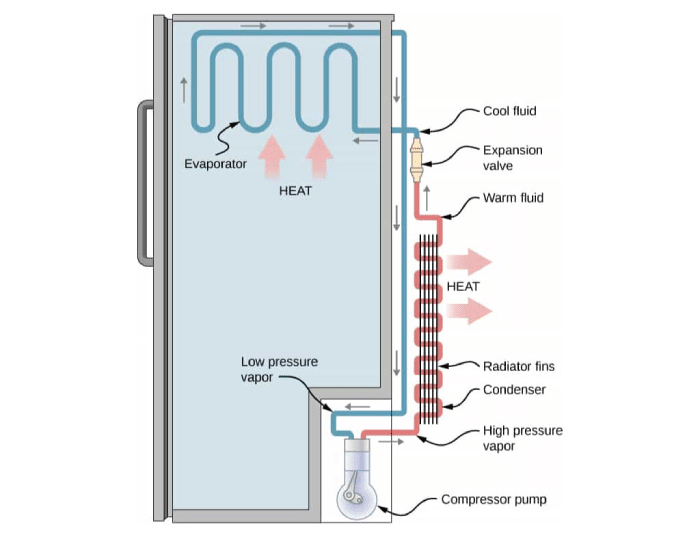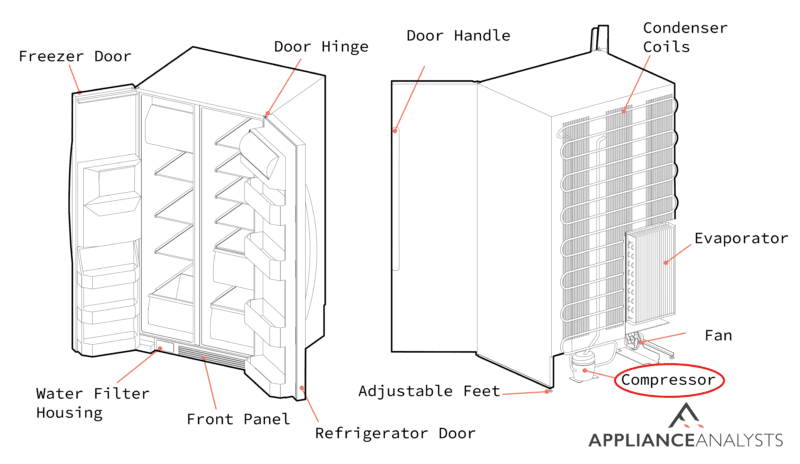We've independently reviewed this article to make sure it's as accurate as we can make it.
To find out more about our article creation and review process, check out our editorial guidelines.
Wondering how to detect a refrigerator Freon leak?
I know how concerning it can be to have a refrigerant leak, especially when your fridge is starting to malfunction.
But don’t worry; I’m here to help!
The signs of a Freon leak in a refrigerator include cooling issues, higher electricity bills, oil residue on the floor, and an uneven frost pattern on the evaporator coils. To fix a Freon leak, you can seal the coolant pipe with sealant, but it’s best to call a professional or replace the entire unit.
Read on to learn more about a fridge Freon leak!
Why trust us? This article was written by Craig Anderson and Andy Fulenchek.
Craig has helped thousands of other homeowners repair their appliances since 2016.
Andy is one of our resident appliance repair experts with over a decade of experience. He currently runs his appliance repair company with a team of trusted technicians.
7 Signs Of a Freon Leak In Your Refrigerator
Refrigerant, also known as Freon, is a vital component of your fridge’s cooling system. Unfortunately, a puncture in the coolant tubes can cause it to leak, resulting in temperature issues and environmental concerns.
But don’t worry. In this section, I’ll guide you through the seven key signs that can help you identify whether your fridge is experiencing a Freon leak.
By recognizing the following indicators, you can fix the leak immediately and ensure your fridge continues to operate efficiently.
The seven most common signs of a fridge Freon leak are:
- POOR COOLING – If a refrigerator is leaking Freon, it won’t be cooling effectively, and the food will get warm and eventually rot. In my opinion, one of the easiest ways to confirm a Freon leak is to check the freezer’s temperature. If only the fridge section is warm, it’s not a refrigerant issue. However, if the freezer and the fridge sections are warm, you probably have a leak.
When dealing with temperature issues, you must check for other causes before assuming you have a refrigerant leak. Examine blocked vents, check the condenser coils, monitor the compressor for irregular operation, and address any defrost problems or malfunctions in fans.
- UNEVEN FROST PATTERN – Examine the evaporator coils for frost. From what I’ve seen, a healthy fridge will have a light coat of frost on 90-95% of the evaporator coils. If only a small portion (like 20%) of the coils is frosted, you probably have a refrigerant issue or a weak compressor.
- RESIDUE – There will be visible residue on your floor if you have a Freon leak. This oily substance is a byproduct of the leak.
- FRIDGE MOTOR CONSTANTLY RUNS – When you have a fridge Freon leak, the motor will be forced to run longer to compensate for the incorrect amount of refrigerant. When a fridge’s motor is forced to work harder, it will eventually burn out.
- HIGHER ELECTRICITY BILL – Because your fridge motor is constantly running at an intense level, you’ll notice you’re using more electricity and getting higher electricity bills. Eek! If you’re noticing a spike in your energy consumption during the winter and summer, it’s always a good idea to check all your appliances for faults.
- SMELL – People often ask me, “What does a Freon leak in a refrigerator smell like?” and the answer, more often than not, is that it’s odorless. However, certain refrigerants can emit a musty, sweet, or unpleasant smell in the event of a leak.
- SICKNESS – If you live in a cramped space with a possibly Freon leaking fridge, you can experience nausea, migraines, and fainting. It’s worth checking out to protect your health!
Finding a Freon Leak
If you’ve experienced most fridge gas leak symptoms, it’s time to delve deeper into the different detection methods.
This section requires a certain level of technical expertise from the reader. It’s essential to be equipped with the appropriate tools and devices for DIY leak detection. If at any point you feel uncomfortable or unsure, it’s best to call a professional. Never put your health or your refrigerator at risk.
Still want to go the DIY route? Follow the steps below to detect a refrigerator Freon leak:
- Do a Visual Inspection – If you find an area of the fridge system with oil traces/leakage where it shouldn’t be, that’s probably your leakage point.
- Soapy Water Detection – Fill the fridge cooling system with nitrogen to a pressure of 20 – 40 psi, and then smear some parts of the fridge system with soapy water. The bubbling area is the leaking point.
- Fluorescent Leak Detection – a fluorescent leak detector will give off a bright yellow or green light under the UV/blue light leak detector. Add the fluorescent agent to the system following the manufacturer’s instructions on the package, and after the system runs for 20 minutes, wearing the special glasses provided, shine the outside of the system with the leakage light detector. The leakage points will be yellow fluorescent and easily spotted.
- Gas Pressure Detection – Using the pressure difference between the interior and exterior of the system, a pressure gauge will detect the difference in gas pressure and express it either digitally or by a voice or electronic signal. It is only a qualitative test to check whether the system is leaking; it will not find the leak for you.
- Electronic Leak Detection – It’s the most modern and reliable detection method. Move the probe of an electronic leak detector over the possible leakage areas, and it will alert you where there is a leakage. The electronic leak detector is a quick, scientific, and accurate way to check for leaks.

Fixing A Refrigerator Freon Leak
When fixing a refrigerator leaking Freon, you should always be careful and consult a professional.
You see, it’s possible to seal the coolant pipes just like any regular pipes using a sealant. However, the issue is replacing the Freon that was lost. In place of the refrigerant, you’ll have air, which isn’t useful in refrigeration!
I’ve seen some DIY enthusiasts attempting to refill refrigerant by tapping into the system with temporary access valves. However, doing so is risky because the entire cooling system contains only 5-6 ounces of refrigerant, and without proper measurements, overfilling is a real danger.
Additionally, replacing the leaked Freon is not a permanent solution and can cause further damage.
Calling a professional to fix a sealed cooling system properly is recommended. However, it can be very expensive. It costs over $600 for a leak repair and $1000 or more if the compressor and evaporator need replacement. It’s often more cost-effective to replace the entire refrigerator.
It’s very important to note that Freon as a substance in fridges and elsewhere has been legally phased out for use since 2020. So, from now on, Freon repairs will be more expensive as they become rarer and rarer.
For further information, here’s a link to the Environmental Protection Agency’s information about the phase–out of Freon and other Ozone Depleting Substances: https://www.epa.gov/ods-phaseout
FAQs About Refrigerator Freon Leaks
Now that you know how to detect and fix a fridge leaking Freon, let’s answer the most popular questions about refrigerant leaks.
Is A Freon Leak Dangerous?
Unless you’ve been extensively exposed to your fridge’s Freon and have breathed it in deeply, the common symptoms of mild exposure are worrying but not life-threatening – things like dizziness, shortness of breath, and feeling nauseous.
However, it’s important to note that refrigerant leaks are VERY rare. There has to be significant damage to the fridge or its piping to allow the Freon to escape.
Keep in mind that children and pets will be most affected because Freon is a gas that sinks low to the ground when released.
Since there are health dangers, a Freon leak is something you want to get sorted out as soon as possible, either by confident and skilled DIY intervention or by calling a professional.
What is Freon, exactly?
Freon is a synthetic chemical refrigerant. It’s a chemical that can be used to exchange temperature with the surrounding environment.
Refrigerants are usually in the form of a gas, but the cool thing about them is that they can transform into liquid and gas form, which makes them very handy for managing temperature in things like fridges, cars, ventilation, and heating systems.

Since refrigerants have been used, they’ve been improved and modernized to avoid potential environmental damage and ensure that they’re safe to have around humans. Many appliance manufacturers have changed their refrigerant agents from Freon to things like R600a and Propane, which are non–toxic hydrocarbons and eco–friendly.
Freon is also called an R22 refrigerant, meaning it has 22 fluorine atoms in its compound.
How Does Freon Work In A Refrigerator?
Refrigerants like Freon work on heat transfer, fluid dynamics, and the different states of matter – from a gas to a liquid.
Refrigerants do their job well because they don’t damage mechanical materials, they aren’t toxic if they’re fully contained, and in the proper working conditions, they’re considered safe to use in places like your kitchen refrigerator.

Refrigerants work by ‘swapping’ temperature with the surrounding environment. So, the Freon in your fridge is pushed through the coils of your fridge, and these coils allow the Freon to interact with the surrounding environment.
Other components like the condenser, evaporator, compressor, and TX valve all affect the state (gas or liquid) and the temperature of the Freon as it works to keep your fridge nice and cool.
Where is the Freon in my Fridge?
You will find the Freon line for your fridge by looking for the compressor tank – the large tank at the back of the refrigerator behind the back panel.
The Freon line attaches to the compressor tank and feeds into the fridge.

Check the owner’s manual for your particular make/model of the fridge to ensure that you’ve identified the right line, and if attempting any repair, refer both to your manual and to expert advice to ensure that you don’t damage the appliance or injure yourself.
Wrapping Up: Fixing a Refrigerator Freon Leak
Hopefully, now you know how to fix a refrigerator leaking Freon.
Remember that a fridge Freon leak can often be detected if there’s some oily residue on your floor, you’re experiencing cooling issues, there’s an inconsistent frost pattern on the evaporator coils, or you’re feeling sick. Don’t forget to call a professional to fix the leak or replace the entire unit.
Thank you so much for reading! Please check out our other related free guides if you found this post helpful.
Good luck!









